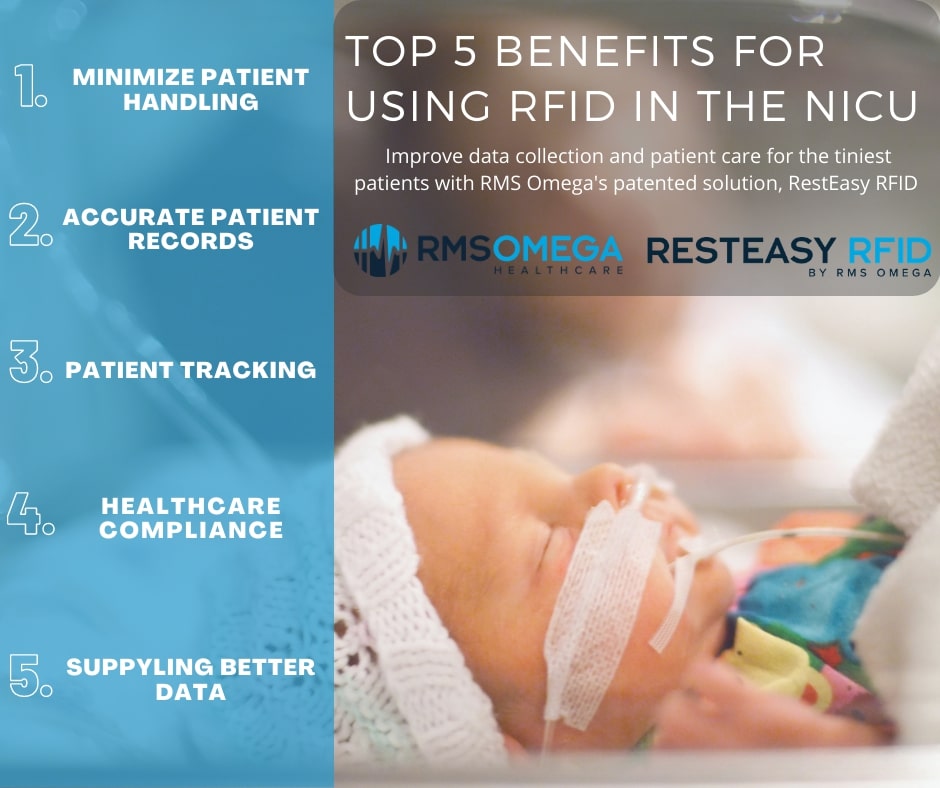
NICU Overview
According to the World Health Organization, an estimated 15 million babies are born prematurely each year and the number appears to be rising. The rise in NICU admissions calls for more modernized and efficient solutions that promote the best patient care and optimal patient flow. RFID solutions won’t help lower the number of pre-term births but implementing them will make sure that hospitals have the best processes in place that ensure proper patient care, accurate data entry, real-time patient tracking, healthcare compliance, and robust data for better managerial decisions. Before looking at the top 5 applications for RFID in the NICU, it is important to know the differences between active and passive RFID systems.
Active vs. Passive RFID
Passive RFID is an inexpensive method involving battery-free tags and RFID readers. In this system, tags emit a low-frequency signal that is picked up by RFID readers. Passive RFID is commonly used if there are a lot of items you need to track. However, you can only see when the item has entered or left a checkpoint and can’t track the item in real time. Additionally, this system will not be able to locate an item that has been moved outside of where your passive system is set up.
Conversely, active systems have tags that are constantly emitting a signal to readers. Active RFID supplies you with real-time information and doesn’t require much infrastructure for deployment. Unlike passive tags, active tags will require battery power and they do generate a lot of data toward the cloud so a relatively larger bandwidth is required.
Regardless of which type of RFID system you chose, both offer an array of benefits in the NICU.
Learn more about RFID in Healthcare!
Top 5 Benefits of RFID in the NICU
1. Minimizes Patient Handling
Hospital staffs are committed to making NICUs a low-stress environment. With this in mind, hospitals require a solution like RFID where patient info can be obtained with a reader through the isolette walls. With RIFD, NICU nurses can obtain the data they need without disturbing their patients.
Unfortunately, many NICU babies need to be connected to additional medical equipment. However, a non-pervasive means of collecting data, like RFID, would improve patient care and the data collection process.
2. Accurate and Automatic Patient Records
RFID makes data entry automatic and reduces the chance of any entry errors. Additionally, NICU babies see a wide variety of specialists and healthcare professionals so RFID would ensure that records are kept consistent and constantly updated between personnel.
RFID tags store patient data in a database on the network’s server. In turn, the system can register patient ID as well as blood sample data and correct patient medications. As a result, both clerical and even fatal medical errors can be drastically reduced.
3. Patient Tracking
Patient tracking is useful in identifying how long patients are staying in the NICU. This data gives great insight to hospital managers and department heads for creating better patient flow. RFID tags are also useful in more extreme cases like locating patients. Alarms will trigger if tags are taken off or if they venture too close to an exit. By alerting staff, this feature ensures peace of mind and patient safety.
4. Healthcare Compliance
RFID is effective at not only identifying the right patient and medication but also ensuring compliance with other practices. Most importantly, a good RFID system can guarantee that surgical equipment goes through proper sterilization processes. Embedded tags will verify that tools have gone through sterilization checkpoints and that they have gone through for an appropriate amount of time. This is just another way how RFID can eliminate critical medical errors that jeopardize patient safety.
Additionally, RFID tags can be used to track medications after they leave the manufacturer, which must be done according to federal law. RFID makes this process easier while also possessing information about drug expiration and if medications have hit the appropriate checkpoints on their way to the patients.
5. Supplying Better Data for Managers
RFID solutions are a manager’s best friend in helping improve healthcare operations. Primarily, RFID can be used in the NICU as a no-hassle means of collecting patient data. RFID makes the NICU a more low-stress environment for infants and nurses alike. Automatic data collection also keeps patient records consistent and error-free which is important in the NICU environment where babies will be looked at by a variety of personnel. Beyond the NICU, RFID systems are an extraordinary asset to healthcare as a whole.
Managers can use valuable RFID data to identify and solve inadequacies in patient flow and inventory management. Furthermore, giving the right medication to the right patient becomes a guarantee with a good RFID system, therefore reducing critical medical mistakes. Additionally, management and department heads can monitor compliance with both drugs and surgical equipment, giving them a more comprehensive view of their healthcare operations. Reduction of critical errors, improved patient safety, streamlined data collection and better operations efficiency can all be realities with an RFID system. A properly implemented RFID system provides a two-fold benefit to hospital management by increasing operations efficiency and patient well-being.
Learn more about RMS Omega’s patented solution, RestEasy RFID™